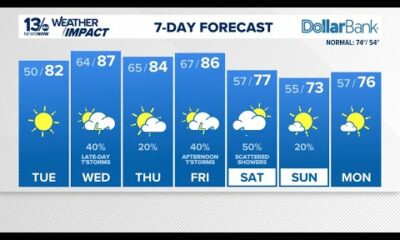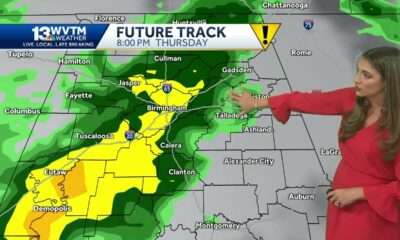News from the South - Kentucky News Feed
New tiger on exhibit at Louisville Zoo
News from the South - Kentucky News Feed
Study in contrasts: Racing, breeding shine in Kentucky as sport dims across America
by Tim Sullivan, Kentucky Lantern
April 28, 2025
Beyond Kentucky’s borders, horse racing is a sport in steep decline. Within the commonwealth, however, wealth is common.
Though no fewer than 48 American racetracks have closed since 2000, Kentucky operators continue to invest hundreds of millions in their facilities and are reaping an outsized return, and not only on the first Saturday in May.
For instance:
Churchill Downs Inc. reported record net revenue ($2.7 billion) and net income ($427 million) for 2024.
Keeneland’s September Yearling Sale netted a record $427.9 million.
The 2006 races run in Kentucky in 2024 paid an average purse of $112,648, 20% higher than the second most lucrative state (Arkansas).
September’s seven-day all-grass meet at Kentucky Downs in Franklin paid out $490,789 per race, easily the highest total ever recorded at a North American track.
“Retreat to Kentucky if you want a future in racing,” California horseplayer Andy Asaro tweeted on April 15. “Things are moving fast.”
Beyond the Bluegrass, things are moving mostly in reverse. Jockey Club data shows the number of Thoroughbred races run in the United States has dropped by more than 50% since 1995, and the size of the national foal crop has been falling even faster, from 34,358 in 2007 to an estimated 16,675 last year. The Sonoma County Fair recently announced it will forego live racing for the first time since 1936 because of a shrinking supply of horses in Northern California. Last month, the Louisiana Supreme Court ruled the state’s historical horse racing machines unconstitutional, prompting Churchill Downs Inc. to project a 25% cut in purses at its Fair Grounds racetrack.
Slots-lite a double-edged sword
Meanwhile, “decoupling” legislation that could free Florida gaming operators of the obligation to stage live racing as a condition of their licenses has been stalled, but may only represent a temporary reprieve from redevelopment of major tracks. The Stronach Group’s 1/ST Racing, which owns Gulfstream and Santa Anita, has threatened to sell both tracks while showing a pronounced inclination to divest rather than invest in its properties. Last year, the company closed Golden Gate Fields near San Francisco and cut a deal that turned over Baltimore’s Pimlico, the home of the Preakness Stakes, to the state of Maryland.
Against this gloomy backdrop, and in contrast to its own contentious closure of Arlington Park near Chicago, Churchill Downs Inc. continues to spend aggressively on its flagship track. Plans for new capital projects with a projected cost of $920 million were put on pause last Wednesday, ostensibly in response to the uncertainty surrounding tariffs and trade disputes, but recent improvements to the paddock and the addition of Homestretch Club and Turn One Experience cost in excess of $300 million and speak to management’s long-term bullishness.
While these investments are largely attributable to the singular appeal of the Kentucky Derby, they also reflect the thoroughbred industry’s political influence in Frankfort and, in turn, the gushing revenue stream historical horse racing (HHR) terminals have unleashed.
Since their 2011 introduction at Kentucky Downs, the slot-like historical horse racing terminals have reinvigorated racing in the state. Programmed to pay out based on the results of races previously run, Kentucky’s HHR machines generated more than $9.6 billion in handle during the 2024 fiscal year, accounting for $99 in bets for every $1 wagered live at the state’s thoroughbred and standardbred tracks.
They contributed $55.5 million to Kentucky’s Thoroughbred Development Fund during that 12-month period, fueling the growth of purses that have more than doubled since 2017. Consequently, Eric Hamelback, CEO of the National Horsemen’s Benevolent and Protective Association, refers to HHR’s proliferation as racing’s “golden ticket.”
When HHR’s legality was challenged in 2018, Ellis Park General Manager Jeffery Inman said the loss of that revenue would “likely threaten the very survival of one of Kentucky’s iconic racing venues.” Though opposition was vocal, it was handily outvoted. Attorney Ryan Roark, in an article published in the Kentucky Law Journal, wrote that the legislature settled on a definition of pari-mutuel wagering “not shared by anyone outside Kentucky … to allow for the powerful horse industry to exclusively run their slot-like gaming systems.”
The result, says Churchill Downs CEO Bill Carstanjen, has been a “juggernaut.” According to the Kentucky Horse Racing Commission, gross HHR commissions for Churchill Downs’ two Derby City Gaming locations exceeded $224 million for the 2024 fiscal year, nearly 12 times the total commissions from on-track wagering at all of the state’s racetracks.
To the extent this disparity underscores the industry’s reliance on revenue sources that require no physical horses, it inevitably raises questions about racing’s sustainability and the best use of its real estate.
“Racing is on life support in Southern California, Florida, Delaware, Pennsylvania etc. and exists almost everywhere else only with the support of non-racing revenues from slots, casinos and state supplements,” Kenwood Racing founder H. Robb Levinsky wrote in a January letter to Thoroughbred Daily News. “Instead of embracing innovative ideas to make the sport more attractive to a new generation of racing fans and owners, the focus continues to be on protecting those non-racing revenues. An industry where 80-90% of purse money comes from slots instead of wagering on the core product is simply not viable in the long run.”
Signs of progress in New York, Maryland
In the short run, at least, the growth of Kentucky’s purses has led to a higher quality of horses competing in the state, more interest among bettors and a breeding boom running contrary to national trends. As Ed DeRosa documented for Horse Racing Nation, Kentucky passed both California and Florida in total handle in 2024 after trailing both states annually since 2007.
“We’re the only jurisdiction (among the top four states) that has grown since 2020,” said Chauncey Morris, executive director of the Kentucky Thoroughbred Association. “The rest have contracted.”
And as cash incentives for Kentucky-breds have increased, so has the state’s share of registered foals. When HHR was introduced at Kentucky Downs in 2011, Kentucky produced 29.2% of the national foal crop. In 2023, the most recent year for which statistics are available, it was 42.2%.
“In states where racing has a good relationship with state legislators, racing is in good shape,” said consultant Damon Thayer, formerly the Kentucky Senate’s majority floor leader. “In states where they have not cultivated a long-term relationship with the legislature, horse racing is either in a declining state, a crisis state or a questionable state.”
In addition to Kentucky, there are pockets of progress. New York and Maryland have committed nearly a billion dollars to renovations at Belmont Park and Pimlico. Multiple industry executives cited developments in Wyoming, the nation’s last populous state, as a basis for bullishness. Yet their optimism is tempered by unsolved problems in larger locales, including the most populous state, California.
Without supplemental income from other forms of gambling, California’s racing and breeding businesses have been contracting for decades. Efforts to enhance purses through HHR remain at the discussion stage in view of Native American tribes’ virtual monopoly on the state’s casino gaming. Unless some accommodation can be reached, racing columnist Ray Paulick warns, “racing in California is history.”
“You can put 1,000 HHRs in at Santa Anita and it would change California racing overnight,” Thayer said. “They’d be wildly popular. You’d direct the money to purses and breeders reward programs and it would be a huge success. It seems like some sort of attempt should be made to cut a deal with the Indians and convince them that 1,000 HHRs at Santa Anita is not going to damage their land-based casinos. . .
“Like Cyndi Lauper used to say, money changes everything.”
YOU MAKE OUR WORK POSSIBLE.
Kentucky Lantern is part of States Newsroom, a nonprofit news network supported by grants and a coalition of donors as a 501c(3) public charity. Kentucky Lantern maintains editorial independence. Contact Editor Jamie Lucke for questions: info@kentuckylantern.com.
The post Study in contrasts: Racing, breeding shine in Kentucky as sport dims across America appeared first on kentuckylantern.com
Note: The following A.I. based commentary is not part of the original article, reproduced above, but is offered in the hopes that it will promote greater media literacy and critical thinking, by making any potential bias more visible to the reader –Staff Editor.
Political Bias Rating: Centrist
The content provided primarily focuses on the state of horse racing in Kentucky and the economic factors surrounding it, without overt political ideologies or agendas. It presents factual data regarding revenue, investments, and industry trends while addressing challenges faced by the sport in a straightforward manner. The analysis includes both positive developments (such as revenue growth) and negative trends (such as declines in racing overall), indicating a balanced approach. While there are mentions of legislation and the influence of the horse racing industry on politics, these elements are presented contextually rather than as a critique or endorsement of specific political positions. Thus, the piece maintains a centrist tone.
News from the South - Kentucky News Feed
Bob Baffert is back at the Kentucky Derby with 2 contenders after serving a 3-year suspension
SUMMARY: Bob Baffert returns to the Kentucky Derby for the first time in four years after serving a suspension due to Medina Spirit’s failed drug test. Settled back in Barn 33, he feels optimistic with two strong contenders, Rodriguez and Citizen Bull. Having missed the Derby for three years, Baffert found it difficult to watch. His reputation suffered after a 2021 disqualification, but Churchill Downs lifted his suspension in July 2023. He acknowledges the toll this ordeal took on him and his family, but remains dedicated to horse training, finding joy in the journey despite challenges in the sport.
The post Bob Baffert is back at the Kentucky Derby with 2 contenders after serving a 3-year suspension appeared first on www.wtvq.com
News from the South - Kentucky News Feed
Streaking Journalism is 3-1 morning line favorite for 151st Kentucky Derby at Churchill Downs
SUMMARY: Journalism is the 3-1 favorite for the 151st Kentucky Derby, drawing attention for its favorable No. 8 post position, which has the second-most wins in Derby history. Sovereignty is the 5-1 second choice, starting from the No. 18 post, while Sandman is 6-1 and starts from No. 17. Bob Baffert returns to Churchill Downs with two entrants: Rodriguez at 12-1 from No. 4, and Citizen Bull at 20-1 from No. 1. Journalism, trained by Michael McCarthy, is on a four-race win streak, including a victory in the Grade 1 Santa Anita Derby on April 5.
Read the full article
The post Streaking Journalism is 3-1 morning line favorite for 151st Kentucky Derby at Churchill Downs appeared first on www.wtvq.com
-

 SuperTalk FM6 days ago
SuperTalk FM6 days agoNew Amazon dock operations facility to bring 1,000 jobs to Marshall County
-

 News from the South - Missouri News Feed2 days ago
News from the South - Missouri News Feed2 days agoMissouri lawmakers on the cusp of legalizing housing discrimination
-

 News from the South - Alabama News Feed7 days ago
News from the South - Alabama News Feed7 days agoPrayer Vigil Held for Ronald Dumas Jr., Family Continues to Pray for His Return | April 21, 2025 | N
-

 News from the South - Florida News Feed6 days ago
News from the South - Florida News Feed6 days agoTrump touts manufacturing while undercutting state efforts to help factories
-

 News from the South - Florida News Feed6 days ago
News from the South - Florida News Feed6 days agoFederal report due on Lumbee Tribe of North Carolina’s path to recognition as a tribal nation
-

 Mississippi Today4 days ago
Mississippi Today4 days agoStruggling water, sewer systems impose ‘astronomic’ rate hikes
-

 News from the South - Oklahoma News Feed6 days ago
News from the South - Oklahoma News Feed6 days agoOklahoma Treasurer’s Office Faces Scrutiny Over Use of Signal in Anti-ESG Coordination
-

 Mississippi Today1 day ago
Mississippi Today1 day agoDerrick Simmons: Monday’s Confederate Memorial Day recognition is awful for Mississippians










































